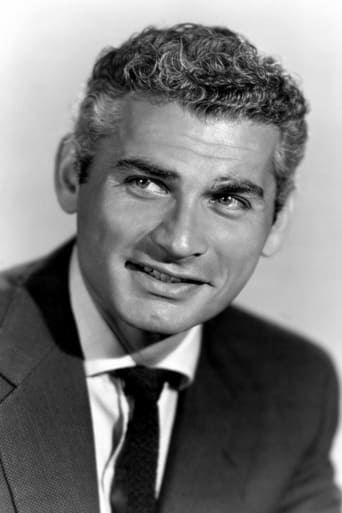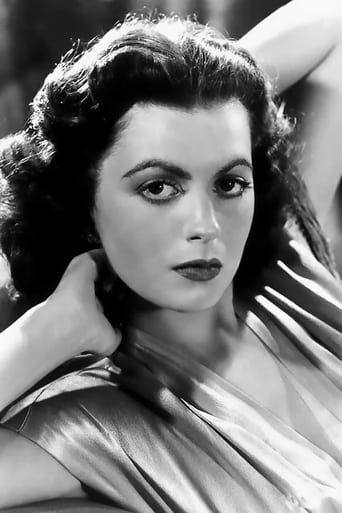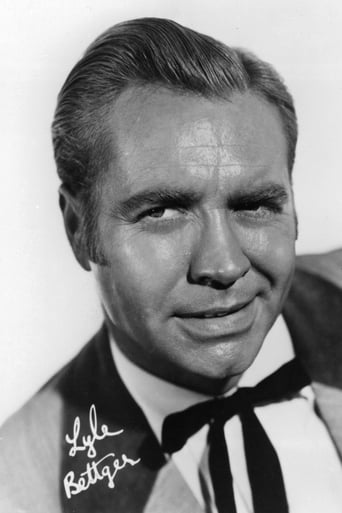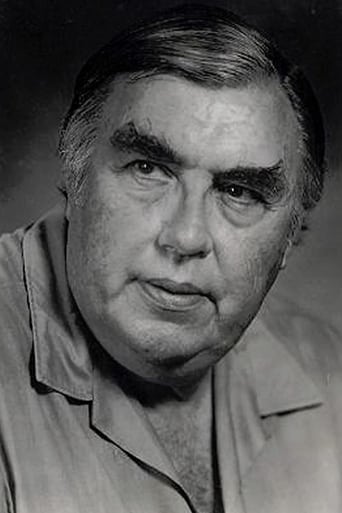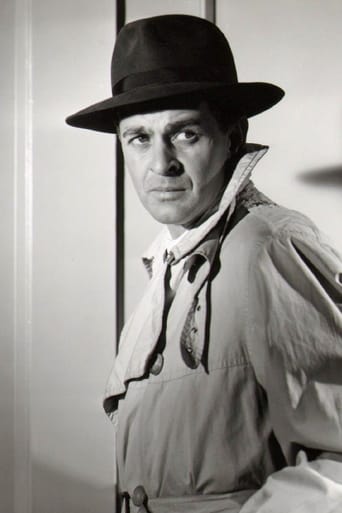GamerTab
That was an excellent one.
Vashirdfel
Simply A Masterpiece
FuzzyTagz
If the ambition is to provide two hours of instantly forgettable, popcorn-munching escapism, it succeeds.
Isbel
A terrific literary drama and character piece that shows how the process of creating art can be seen differently by those doing it and those looking at it from the outside.
weezeralfalfa
My title summarizes one of the more unusual features of this Universal Technicolor Civil War western. I should explain that that the veterinarian(Jeff Chandler, as John Westgate) used to be an army surgeon, before he got discouraged trying to save limbs and lives. The screenplay basically is about a major procurer of army horses(Lyle Bettger as Steve Cook) from the northern and central Plains , who has been recently obtaining his horses by stealing from the Sioux , in order to fulfill his contract with the army. Independent horse procurer Joan Britton tried to buy horses from the Sioux, but Red Cloud declined. ....
Some of the subplot components are as follows: 1)Joan's friendship and romance with business competitor Cook vs. newcomer Westgate. It didn't take long for Joan to forget Cook, and team up with Westgate. 2)Cook vs. the small procurers, who look at him with envy, with his army contract. Westgate suggests they band together and pool their resources. But, for a while, they want to lynch Westgate as a suspected murderer.3) The question of whether Westgate will eventually reverse his decision to give up on human surgeries, especially after he does the appendectomy on Cook.
4)The question of whether the Plains tribes will join up with Cherokee Confederate General Stand Watie. After the General gives a pro-Confederate speech at a council of all the major Plains tribes, Westgate gives a speech advising them to stay out of the War..... Stacy Harris, as one -eyed Uriah, serves as Cook's sidekick, who has a penchant for shooting or knifing anyone he sees in his way. ...Peter Whitney turned out to be a friendly blacksmith, who often neglected his work to follow Westgate around as his sidekick. They were often seen with Joan....John War Eagle served as Chief Red Cloud, who did nearly all the talking for the Sioux. ... Glen Strange, who played General Stand Watie was appropriately part Cherokee. His name was derived from that of real Cherokee general of the Confederacy.....Stephen Chase served as Major McKay, commander of the nearby fort.. His detachment helped to capture Cook, after Cook had a tussle with Westgate: the second such episode...... Cook stole horses from the same Sioux , not once, but several times, with the Sioux giving chase the last time: constituting 'the great Sioux uprising'....The film is moderately interesting, not pretending to be a classic. At least, the Sioux Chief was played by a real Indian. Don't confuse this film with "The Great Sioux Massacre", which is yet another expose of the Battle of the Little Big Horn.
a-caplan
Not a great or even a very good Western, but notable, for 1953 (more than ten years before Cheyenne Autumn), for its relatively strong anti-racist message with reference both to the Abolitionist issue in the Civil War and to the long history of failed promises to Native Americans. Given the standard tendency of Westerns (at best) to skirt over race entirely or to present a favorable interpretation of the Confederate cause, this is no small issue. Apart from Dr Westgate's (Chandler) obvious sympathy for the Indian position, he presents his case for Indian neutrality in the Civil War to the Sioux Council, citing the clear racism of the Confederate general (which he implied would be transferred to the Sioux if they made common cause with the Confederates) and the sacrifice being made by Northern troops in the cause of racial equality. Elmer Daves' Broken Arrow of 1950 with James Stewart and Chandler had already raised the issue of Indian grievances against US Indian policy, but this was emphasizing the message in a 'B' Western context.
bkoganbing
The Great Sioux Uprising in the tradition of B westerns is a misnomer of a title. No great uprising takes place though not for Lyle Bettger's efforts to get one started.During the Civil War Bettger is a horse dealer and the biggest one around. He'd like to merge with another dealer, Faith Domergue and crush his other competitors. The reason he's the biggest horse dealer around is that Bettger steals his horses from the Indians and gets top dollar for them from the army. Kind of an unfair advantage don't you think?Enter Jeff Chandler former Union Army surgeon now a veterinarian who has given people doctoring because of a war wound and now tends to animals. He sees what Bettger is doing and tries to organize the opposition, but Bettger is a very clever villain if a little less psychotic than he usually is in films.There's also a Confederate general in the area looking to make his own deal with the Sioux. It all adds up to an interesting western of the Civil War era.There are some interesting supporting performances by friendly blacksmith Peter Whitney and from Stacy Harris a really mean psychotic sort who is Bettger's right hand man. For Jeff Chandler's loyal legion of fans.
zardoz-13
"Knute Rockne All American" director Lloyd Bacon's average American Civil War era oater "The Great Sioux Uprising" doesn't qualify as great in any sense of the word. This concise 81-minute horse opera about a former Union Army physician who exposes a dastardly rancher as a no-account horse thief who has rustled hundreds of steeds from the eponymous Indians amounts to a series of contrivances that a good cast and competent directing by veteran helmer Bacon, with as many as 130 feature films to his credit, cannot entirely offset. Rugged Jeff Chandler is believable as the humble army doctor who has lost confidence in his ability to perform surgery since he received a war wound in the hand. Lyle Bettger acquired a reputation during the 1950s playing treacherous villains in a number of westerns. Bettger was thoroughly convincing as an adversary whether he tangled with either Burt Lancaster's Wyatt Earp in "Gunfight at the O.K. Corral" or challenged Clayton Moore's masked man in "The Lone Ranger." Bettger certainly gives Jeff Chandler a run for his money in "The Great Sioux Uprising" as a crooked rancher who struggles to corner the market on selling horses to the U.S. Cavalry. When he isn't rustling horses, he latches his lusty eyes latched onto the heroine, Faith Domergue, who provides him with only minor competition. Of course, our heroine wants nothing to do with Bettger and prefers the affections of Chandler. "The Great Sioux Uprising" alternates between the Universal back lot and the plains of Pendleton, Oregon.The U.S. Cavalry desperately needs remounts and Major McKay (Alden 'Stephen' Chase of "When Worlds Collide") cannot get enough of them either from Stephen Cook (Lyle Bettger) or Joan Britton (Faith Domergue of "Escort West") to ship back east. McKay believes if the Union Army had more horses that General McClellan could have crushed General Robert E. Lee's Army of Northern Virginia at the bloody battle of Antietam. Clearly, "Crime Ring" co-scribes J. Robert Bren and Gladys Atwater along with "The Robin Hood of El Dorado" scenarist Melvin Levy and "Chatterbox" writer Frank Gill Jr., who provided additional dialogue, knew nothing about the pusillanimous McClellan. McClellan constantly worried that Lee had him outnumbered even when McClellan's troops outnumbered Lee's men. Anyway, their loquacious screenplay has the villains conniving in what resembles an old B-movie western as Cook tries to hold onto his horse flesh monopoly. Joan makes a promise to round up substantially more horses for Major McKay. She convinces her Native American housekeeper to take her out to see Chief Red Cloud (Johnny War Eagle of "Tomahawk") and tries to persuade him to sell her his herd of horses so that lives on both sides of the fighting can be saved. Chief Red Cloud turns Joan down cold and warns Joan's housekeeper to never return with the white lady. The Chief has a very low opinion of whites because they speak with "forked tongues." Meanwhile, Cook and his second-in-command, Uriah (Stacy Harris of "Comanche") drool from afar over the hundreds of horses grazing on the slopes. After Joan and company ride off, Cook and his gunmen rustle the herd, kill some Indians, and hightail it. Uriah's horse catches an arrow the flank.About a quarter-hour into the action, Jonathan Westgate, M.D. (Academy Award nominee Jeff Chandler of "Yankee Buccaneer"), rides into town and strikes up a Bible-quoted conversation with the local blacksmith, Ahab Jones (Peter Whitney of "Action in the North Atlantic"), and promptly finds himself with a place to stay. Westgate assures Ahab that he can operate on both man and beast. It doesn't take Ahab long to introduce Westgate to Joan and she takes a shine to him. She isn't the only one who takes a shine to him. The small ranchers complain about Cook dominating them and Westgate suggests that they band together and drive their horses to the fort. Cook and Uriah kidnap Westgate and hold him against his will at his ranch. Meantime, Cook rides out to see the small ranchers and bullies them into submission. One of them, the one-armed Joe Baird (Walter Sande of "Bad Day at Black Rock") refuses to cower and rides off with his string of mounts. The evil Uriah steals Westgate's operating scalpel and attacks Baird on the trail and murders him. A townsman loyal to Cook brings in Baird's body and shows the citizens the scalpel that belongs to Westgate. Not only does Cook release Westgate but he also gives him the horse of Westgate's choice. The horse turns out to be the one that was hit by the arrow. Back at Cook's ranch, Westgate wins his freedom when Cook has a seizure and Westgate operates on him. When he arrives in town, Westgate has to flee because the townspeople want to lynch him for killing Baird. Ahab disguises himself as Westgate and leads the lynch obsessed mob on a wild goose chase. Westgate believes that if he can bring in Red Cloud to identify the horse that he can get McKay to arrest the rancher. Later, the devious Cook learns about Westgate's plan and burns down the stable that houses the horse.Mind you, there is no seeming shortage of plot here. Eventually, Westgate proves that Cook is the culprit that stole from the Indians. Indeed, Westgate talks the Sioux and other Indian nations out of joining the Confederacy when Southern General Stan Watie (Glenn Strange of "Gunsmoke") furnishes them with carbines and tries to incite them against the Union. The villains get their comeuppance and our hero recovers and puts back on his uniform. Again, Bacon keeps the contrived plot moving along at a steady pace with some action scenes. There isn't a lot of time for romance between Chandler and Domergue. Peter Whitney shines as the garrulous Ahab and Bettger makes a menacing villain with a shred of humanity. "The Great Sioux Uprising" is a standard-issue horse opera with an interesting plot but it lacks a larger-than-life clout.
